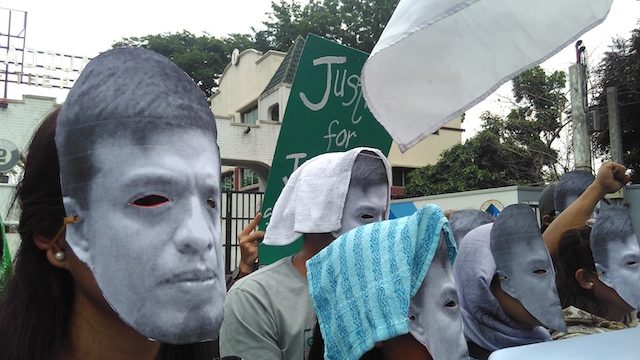SUMMARY
This is AI generated summarization, which may have errors. For context, always refer to the full article.

MANILA, Philippines – Human rights groups on Friday, June 8, called on the administration of President Rodrigo Duterte to put an end to enforced disapparances and the drug war killings.
In a press briefing, the Asian Federation Against Involuntary Disappearances (AFAD) said the country is experiencing its “worst human rights crisis” since Martial Law.
“This violent crackdown on illegal drugs has plunged the country into its worst human rights crisis since the Marcos dictatorship with an unprecedented number of human rights violations and among which are enforced disappearances and extrajudicial killings,” AFAD secretary general Mary Aileen Bacalso said.
The groups lamented the lack of justice for victims of enforced disappearances 6 years after a law that criminalizes such acts took effect.
“It has been said that when there are no heroes in life, the monsters win,” Nilda Sevilla, co-chairperson of Families of Victims of Involuntary Disappearance or FIND. “We are in a situation where we have the unique opportunity at a crucial time in history to prove this statement wrong.”
As of end of 2017, AFAD said, there are 1,993 documented cases of enforced disapparance under various administrations in the Philippines. Out of this number, 1,166 are still disappeared, 584 surfaced alive, and 243 were found dead.
To help attain justice, AFAD urged the government to fully implement Republic Act 10353 or the Anti-Enforced or Involuntary Disappearance Act of 2012, which makes the crime of enforced disappearance punishable by life imprisonment.
The first of its kind in Asia, the law was signed by president Benigno Aquino III in 2012. (READ: It’s a first in Asia: ‘Desaparecidos’ law)
AFAD chairperson Khurram Parvez noted how the end of dictatorship did not result in ending the impunity in the Philippines until “human rights is made the priority.”
“Unless and until the rights of people are protected, no country can really prosper in the real means,” Parvez said.
AFAD also pushed for the ratification of the international convention against enforced disappearance – the last and only international convention on human rights that Philippines has yet to sign.
Commission on Human Rights (CHR) Chair Chito Gascon said during the same press briefing that the Philippines, while a signatory to most international human rights treaties, unfortunately, has not yet ratified this last human rights convention.
But the problem of enforced disappearance is not unique to the Philippines.
Asia recorded the highest number of cases submitted by various human rights organizations to the United Nations working group on enforced disappearances. Of the 45,213 cases received by the UN group so far, 27,105 came from the Asia.
“This is indicative of the appalling condition of the phenomenon of disappearances in the region,” AFAD said.
Reaffirm the commitment
Along with the call to implement the law against enforced disappearance, Gascon also urged the government to reaffirm its commitment to the International Criminal Court (ICC).
Last March, the Philippine government made steps to withdraw its ratification of the Rome Statute, the treaty which created the ICC. It is an act which human rights advocates, defenders, and organizations strongly denounced.
The decision came after the ICC’s Office of the Prosecutor announced it was starting a preliminary examination “following a careful, independent, and impartial review of communications and reports documenting alleged crimes” committed in the Philippines since 2016.
“We should affirm to the global community that we are a country that is committed to international justice because enforced disappearances are one of those human rights violations that are perpetrated and perpetuated in the course of crimes against humanity,” Gascon said. – Rappler.com
Jane Bautista is a Rappler intern. She studies journalism at the University of the Philippines Diliman.
Add a comment
How does this make you feel?
There are no comments yet. Add your comment to start the conversation.